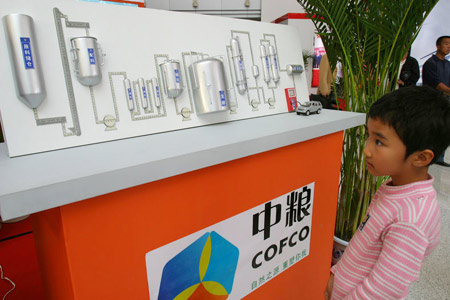Energy
Biofuels to power the future
(China Daily)
Updated: 2010-12-10 09:23
 |
Large Medium Small |
|
 |
|
A COFCO booth demonstrates the mechanics of bioethanol manufacturing at the exhibition in Changchun, Jilin province. [Photo/China Daily] |
Plan to reduce nation's growing dependence on fossil fuels
BEIJING - China's bioethanol production will reach 10 million tons a year by 2020, resulting in a 10 percent drop in oil imports, according to COFCO group, China's largest grain trader.
"To develop a non-fossil fuel by advanced technology within an agricultural context is an important strategy for COFCO," said Lin Hailong, assistant general manager at COFCO's research and development center.
He said the government has given major support to the biofuel industry during recent years, and the cost of making bioethanol, a major ingredient of biofuels, is falling thanks to technological development.
"Because of the government's support and the potential of the market, more players have joined the biofuel industry recently," said Michael Fredskov Christiansen, president of Novozymes (China) Investment Co Ltd.
COFCO, Novozymes and China Petroleum & Chemical Corporation (Sinopec) are jointly involved in a project concerning cellulosic ethanol - a biofuel produced from wood, grasses, or the non-edible parts of plants. CNOOC and DuPont are also cooperating in biofuel projects too.
With the soaring price of fossil fuels, and carbon emissions becoming a global concern, discovering a clean-energy substitute is of paramount importance worldwide.
Bioenergy is considered one of the three key alternatives to fossil fuel use, alongside wind and solar energy, because of its easy acquisition and clean emissions. Biorefining is a conversion process that produces fuel, power, heat, and value-added chemicals from biomass, the biological raw material extracted from organic sources.
According to a report on the future of biorefineries by the World Economic Forum (WEF), together with leading companies and consultancies including Novozymes and McKinsey, the conversion of biomass into fuel, energy and chemicals has the potential to generate upwards of $230 billion for the global economy by 2020.
In China alone, cellulosic ethanol fuel use will replace 31 million tons of gasoline by 2020.
|
||||
The industry will improve China's energy security, boost GDP growth, and balance development between urban and rural regions, according to the WEF report.
According to Lin, a demonstration prototype of the cellulosic ethanol project will be completed by the end of 2011. If successful, the company will begin production within two to three years and then release the final product on the market.
Christiansen said China has a huge market and business opportunities for the biofuel industry, because many provinces keep importing biofuel from Brazil year-on-year.
"China meets all the requirements for biofuel production and also has the necessary geographic resources. There is also a strong domestic demand, so it makes sense to produce the fuel here," he said.
Lin said the government will give more support financially, and by means of a regulatory and policy framework, if the industry achieves more technological breakthroughs and establishes commercial facilities.
Christiansen said his company is still working on some technological barriers and construction problems, but he is sure that the development of biofuel will have a significant effect on China's transport industry.



